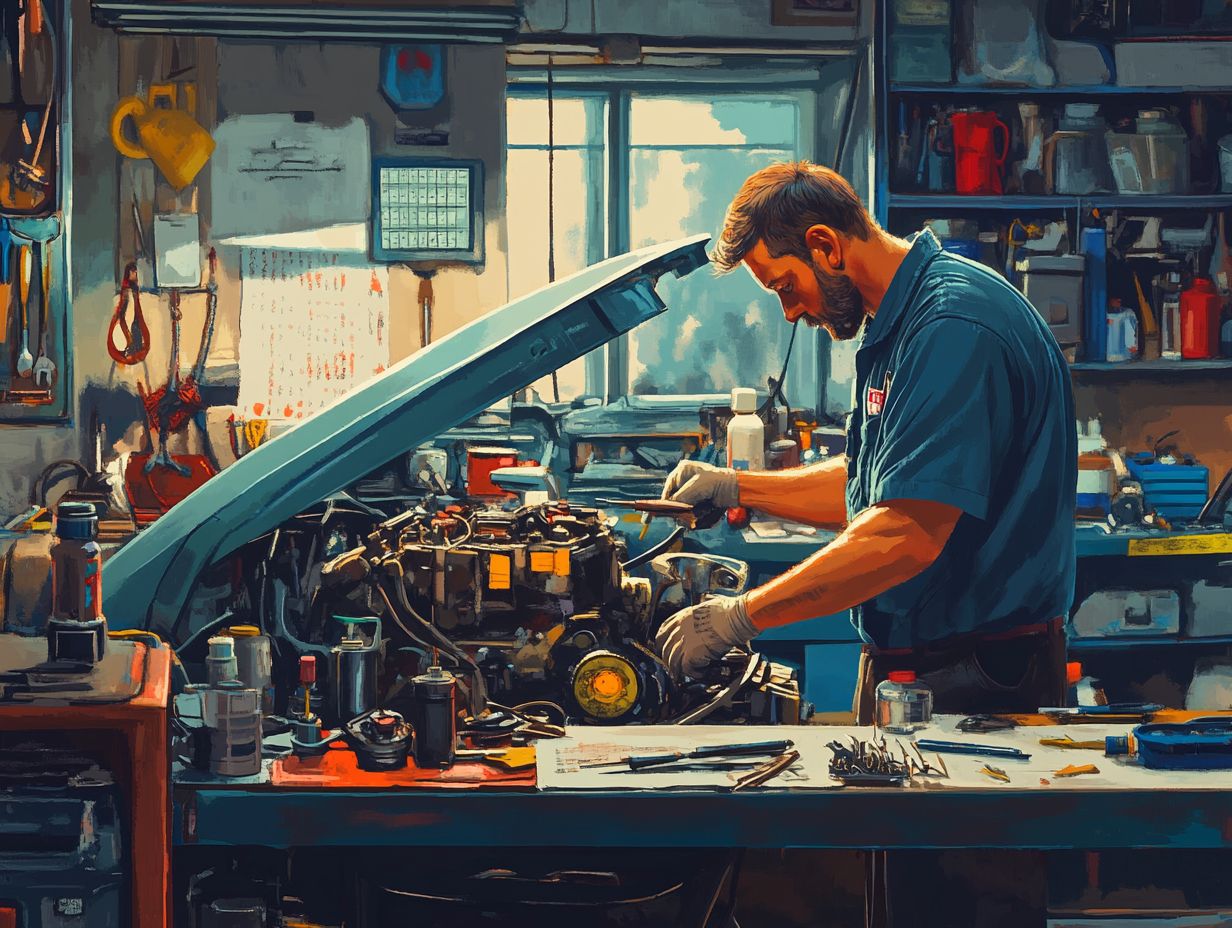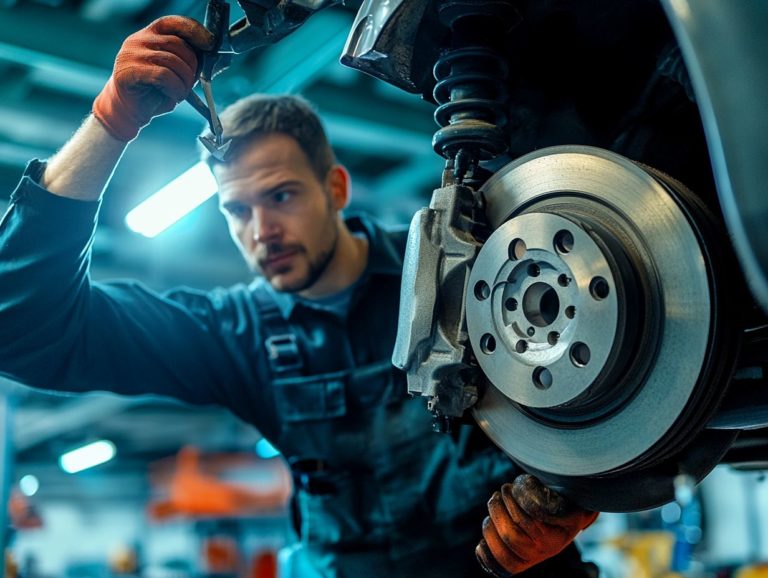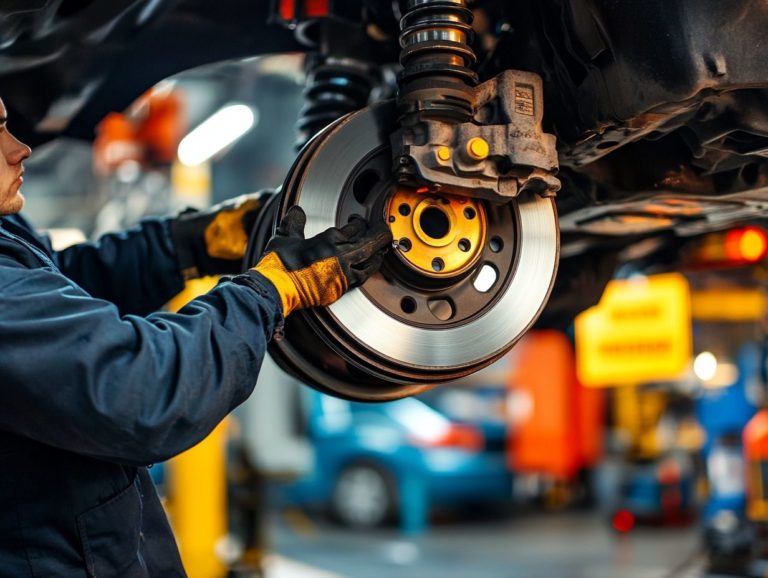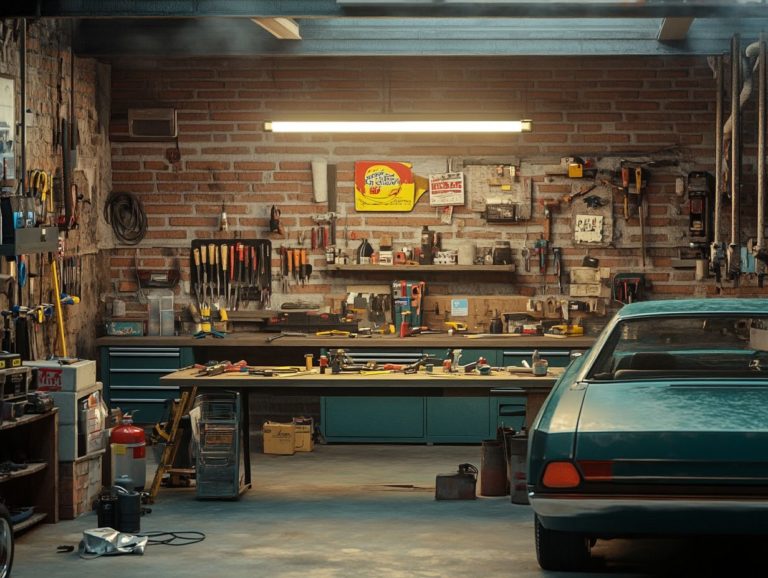The Cost of Common Car Repairs: What to Expect
Car repairs are an unavoidable aspect of owning a vehicle, but grasping their necessity and associated costs can feel quite daunting.
Numerous factors, from the type of repair required to the specific make and model of your car, play a significant role in determining expenses. This article delves into common repairs, such as brake replacements and engine tune-ups, providing valuable insights into their costs.
You will find practical tips to save money through DIY solutions and regular maintenance. Keep your car in top shape without breaking the bank!
Contents
- Key Takeaways:
- Factors Affecting the Cost of Car Repairs
- Common Car Repairs and Their Costs
- How to Save Money on Car Repairs
- Routine Maintenance to Prevent Costly Repairs
- Frequently Asked Questions
- What are some common car repairs and how much do they typically cost?
- Are there any car repairs that tend to cost more than others?
- What factors can influence the cost of a car repair?
- Is it possible to negotiate the cost of a car repair?
- Should I consider getting a second opinion on the cost of a car repair?
- Can I save money on car repairs by doing them myself?
- Frequently Asked Questions
Key Takeaways:

- Car repairs are a necessary expense that impacts costs, including the type of repair needed, the make and model of the car, and location and labor expenses.
- Common car repairs, such as brake replacements, transmission repairs, and engine tune-ups, can be costly, but routine maintenance and DIY tips help you save money in the long run.
- Regularly maintaining your car and learning basic DIY tips can prevent costly repairs and keep your vehicle running smoothly for longer.
Why Car Repairs are Necessary
Car repairs are essential for vehicle ownership, ensuring your car remains in top-notch condition and boosting reliability. Ignoring necessary repairs can lead to unexpected costs that far exceed routine maintenance tasks, such as oil changes and basic inspections.
Recognizing the significance of regular maintenance helps mitigate potential issues that could affect your vehicle s dependability, ensuring it serves as a safe and reliable mode of transportation for you and your loved ones.
Regular inspections and adjustments play a crucial role in extending the lifespan of vital components. Overlooking minor issues, like a slipping belt or a leaking fluid, can lead to major repairs, disrupting your daily routine and straining your finances.
Investing in timely repairs boosts your fuel efficiency and overall performance, saving you money in the long run.
Prioritizing maintenance allows you to sidestep the stress and unpredictability of breakdowns, ultimately crafting a more confident and enjoyable driving experience.
Factors Affecting the Cost of Car Repairs
The cost of car repairs can fluctuate considerably due to various factors, including the type of repair required, the make and model of your vehicle, and the location of the repair shop. Each of these elements is pivotal in shaping the overall maintenance expenses tied to car ownership.
For instance, if you own a luxury brand like a Mercedes-Benz S63 AMG or a Land Rover, you might face higher repair costs compared to more common brands such as Honda or Toyota Corolla. This makes it vital to be informed about potential repair estimates before making a vehicle purchase.
Type of Repair Needed
The type of repair your vehicle needs can significantly affect overall repair costs. Some repairs are pricier due to their complexity or the specific parts required. Routine maintenance tasks, like oil changes or basic inspections, tend to be less expensive compared to more extensive repairs such as transmission work or engine work, which involves major components of the car.
Basic maintenance tasks, including tire rotations and fluid checks, typically range from $20 to $100, making them manageable for most budgets. It’s also important to be aware of the top 10 most common car repairs, as more complex repairs, such as brake replacements or electrical system diagnostics, can escalate quickly, often costing hundreds or even thousands of dollars depending on your vehicle’s make and model.
For instance, replacing a timing belt can cost upwards of $1,000, especially in luxury vehicles where parts are pricier. By familiarizing yourself with these varying cost structures, you can make informed decisions about when to repair or replace your vehicle and anticipate those larger maintenance expenses that might loom on the horizon.
Consider scheduling your next maintenance appointment or learning more about DIY repairs to keep your vehicle in optimal condition.
Make and Model of Car
The make and model of your car play a significant role in determining maintenance costs and repair estimates. Certain brands may require more expensive parts and specialized expertise. For example, maintaining a Honda tends to be budget-friendly and straightforward. In contrast, luxury brands like Land Rover often involve intricate repairs that can drive up costs. Recognizing these differences is essential when evaluating vehicle dependability and long-term ownership expenses.
Brands such as BMW and Audi often demand specialized tools and highly trained technicians, which naturally increases service costs. More common brands use universal parts and often provide a wider range of service options, making it easier to find competent mechanics at lower prices.
This stark contrast between mainstream and luxury vehicles underscores the importance of conducting thorough research into the ongoing expenses tied to vehicle upkeep. Making informed decisions that align with your budget and lifestyle can save you a significant amount in the long run.
Location and Labor Costs

Location significantly influences labor costs related to car repairs, with urban areas generally commanding higher rates than rural ones. Variations in repair costs often stem from local competition and the economic landscape, both of which can sway maintenance costs.
By understanding how location impacts these factors, you can make informed decisions about where to get your repairs done, ultimately affecting your vehicle s reliability.
For example, metropolitan areas usually have more repair shops, which fosters competitive pricing. However, that competition can be counterbalanced by elevated overhead costs for businesses, affecting pricing. In contrast, regions with lower average incomes may see cheaper labor rates, as mechanics adjust their prices to local economic conditions.
You must weigh these factors carefully! They can profoundly affect not just your repair expenses but also the quality of service you receive. This, in turn, influences the longevity and performance of your vehicle.
Common Car Repairs and Their Costs
Common car repairs come with specific costs that every vehicle owner should be mindful of to budget for maintenance effectively. Understanding common car repair costs, such as brake replacements, transmission repairs, and engine tune-ups, is crucial, as they can vary significantly in price based on factors like the make and model of the vehicle.
Being informed about these typical repairs helps you mitigate unexpected expenses and enhances your vehicle s reliability over time. Stay tuned for our next section where we dive deeper into specific repairs and their costs!
Brake Replacement
Brake replacement is not just a routine task; it’s one of the most essential car repairs you ll encounter. Costs can vary significantly based on your vehicle type and the specific work needed. If you drive a reliable brand like Honda, you will likely find that maintenance costs for brake replacement are more manageable compared to those luxurious models.
Being aware of the typical repair costs for brake replacement is key to keeping your vehicle’s reliability and safety in check.
Brake pad and rotor costs usually range from $300 to $800, with pricing influenced by whether you choose a dealership or an independent shop. Several factors come into play, including the type of brake components you’re opting for ceramic versus metal and the labor rates in your region. If you delay the replacement, you might face higher costs later due to potential damage to the braking system.
To stay ahead of the game, regular inspections are your best friend. This proactive approach keeps your braking performance optimal and ensures your safety while navigating the roads.
Transmission Repair
Transmission repair can be one of the most expensive and intricate challenges you may face as a vehicle owner. Understanding the potential costs can help you prepare for unexpected expenses.
Key factors influencing repair costs include the complexity of your transmission system, the availability of parts, and local labor rates. Automatic transmissions often require more intricate repairs than manual ones.
Some brands offer easily accessible replacement parts, which can help keep costs down. However, rarer brands may require a heftier investment due to limited availability.
The age of your vehicle and the overall condition of its transmission play critical roles in deciding whether a repair or replacement is the more financially sound option. By staying informed and proactive, you can navigate these inevitable expenses with confidence.
Engine Tune-Up
An engine tune-up is key for your vehicle’s longevity and reliability. Regular tune-ups lead to enhanced performance and fuel efficiency.
The costs associated with an engine tune-up can vary significantly based on your vehicle’s make and model. Some models may require specialized attention.
Most tune-ups include tasks like replacing spark plugs, checking ignition timing, and inspecting the fuel system. Costs usually range from $100 to $300.
Regular tune-ups aren t just about keeping your engine running smoothly; they also play a vital role in overall vehicle safety and operational efficiency. Integrating these maintenance checks into a broader service schedule can help sidestep potential issues that might escalate into costly repairs.
It s a proactive approach that truly pays off in terms of performance and peace of mind.
How to Save Money on Car Repairs

Saving money on car repairs requires a blend of savvy budgeting, consistent routine maintenance, and strategic application of DIY techniques. By taking a proactive approach to your vehicle’s care, you can sidestep unexpected repair costs from overlooked issues.
By grasping repair estimates and acquiring essential DIY maintenance skills, you empower yourself to manage your vehicle’s upkeep effectively, ultimately slashing repair expenses in the long run.
DIY Tips and Tricks
Engaging in DIY maintenance can be a gratifying way for you to save money on car repairs while ensuring your vehicle stays in excellent condition. Simple tasks like changing your oil, performing basic inspections, or checking fluid levels can help you prevent unexpected repair costs.
Routine tasks, such as rotating your tires and cleaning air filters, can significantly boost your vehicle’s overall performance. Keeping your tires properly inflated not only extends their lifespan but also enhances fuel efficiency, benefiting both your wallet and the environment.
Don t forget about the battery. Checking terminals for corrosion and ensuring clean connections can help sidestep potential starting issues. Regularly inspecting your brake pads and windshield wipers provides peace of mind and safety for your daily drives.
Start your DIY maintenance today to save money and keep your car running like new!
By consistently incorporating these manageable tasks into your routine, you can create a proactive maintenance schedule that safeguards your investment and deepens your connection with your vehicle.
Routine Maintenance to Prevent Costly Repairs
Implementing a regular check-up for your car is crucial for preventing costly repairs and ensuring the long-term reliability of your vehicle. This regular upkeep not only protects the performance of essential systems but also enhances your safety on the road.
Key tasks, like replacing air filters every 12,000 miles, checking brake pads periodically, and maintaining fluid levels, can significantly impact your vehicle s overall health. By scheduling a comprehensive inspection at least once a year, you can identify possible problems early on and spare yourself the inconvenience and financial strain of sudden, major repairs.
Committing to these vital maintenance routines allows you to enjoy peace of mind, confident that your car is running smoothly and efficiently.
Frequently Asked Questions
What are some common car repairs and how much do they typically cost?
Common car repairs include replacing brake pads, changing the oil, and fixing a broken windshield. For more details, check out this resource on understanding the most common vehicle repairs. The cost can vary depending on your car’s make and model, but these repairs usually range from $100 to $500.
Are there any car repairs that tend to cost more than others?
Yes, certain repairs tend to be more expensive. For example, replacing a transmission or engine can cost thousands of dollars. Regularly maintaining your car is essential to avoid these costly repairs.
What factors can influence the cost of a car repair?
The cost of a car repair can be influenced by several factors, including the type of repair, the severity of the issue, the age and make of your car, and the location and labor rates of the repair shop.
Is it possible to negotiate the cost of a car repair?
In some cases, you can negotiate the cost of a car repair. It’s always worth asking the repair shop if they can offer a discount or if there are any alternative solutions that may be less expensive.
Should I consider getting a second opinion on the cost of a car repair?
If you’re unsure about the cost of a car repair or feel like you’re being overcharged, you should definitely consider getting a second opinion. This can help you make an informed decision and potentially save you money.
Can I save money on car repairs by doing them myself?
While some car repairs can be done by yourself, it’s important to have the necessary knowledge and skills to avoid causing further damage. In some cases, it may be more cost-effective to leave it to a professional repair shop.
Start your maintenance routine today to keep your car in top shape!







